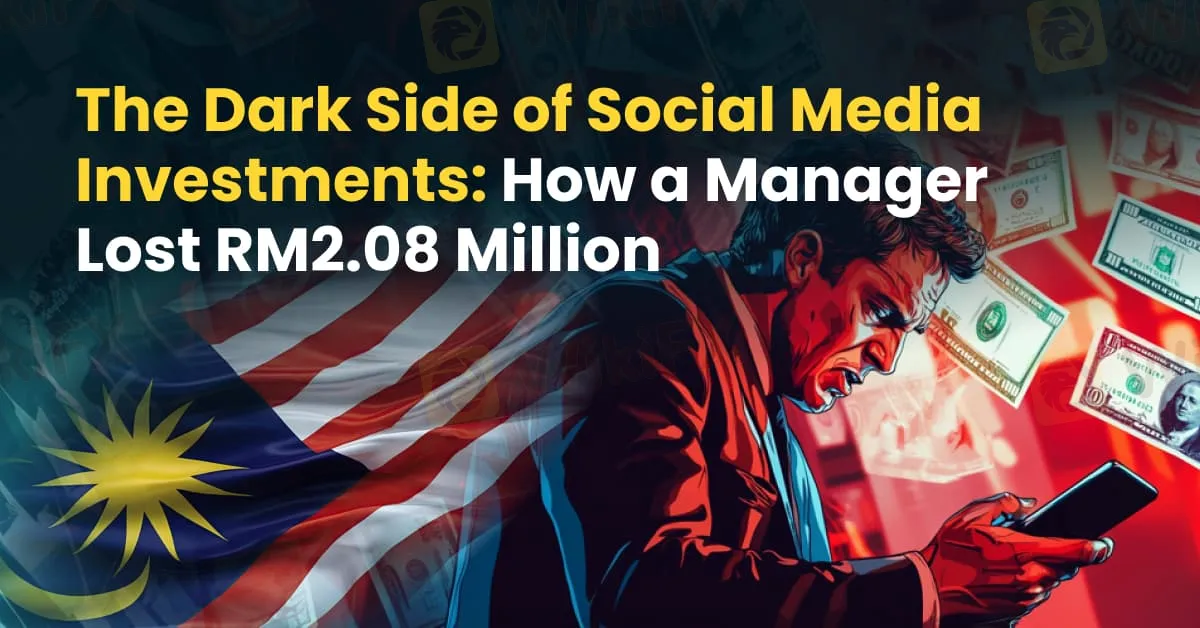简体中文
繁體中文
English
Pусский
日本語
ภาษาไทย
Tiếng Việt
Bahasa Indonesia
Español
हिन्दी
Filippiiniläinen
Français
Deutsch
Português
Türkçe
한국어
العربية
The Dark Side of Social Media Investments: How a Manager Lost RM2.08 Million
Abstract:A Malaysian company manager suffered financial losses amounting to RM2.08 million after becoming the victim of an investment scam promoted through Facebook.

A Malaysian company manager suffered financial losses amounting to RM2.08 million after becoming the victim of an investment scam promoted through Facebook. The fraudulent scheme, which promised lucrative returns, ultimately led to significant monetary losses.
According to Selangor police chief Datuk Hussein Omar Khan, the 52-year-old man became involved in the scheme in August of the previous year. After encountering the investment offer on Facebook, he was subsequently added to a WhatsApp group managed by an individual known as Charles. The group served as a platform for persuading participants to invest in what was later revealed to be a non-existent financial opportunity.

Following the guidance provided by the schemes organisers, the victim proceeded to transfer funds through nine separate transactions to different bank accounts. Initially believing he was making profitable investments, he continued to comply with instructions. However, suspicions arose when he was repeatedly asked to make additional payments to access his supposed profits. At this point, it became evident that he had been deceived.
Authorities have classified the case under Section 420 of the Penal Code, which deals with cheating offences. Law enforcement officials have reiterated the importance of public vigilance when encountering investment offers on social media, particularly those that promise unrealistic returns.
With online financial fraud becoming increasingly sophisticated, industry experts emphasise the necessity of verification tools that help individuals assess the legitimacy of brokers and investment platforms. One such tool, WikiFX, has gained prominence for its role in equipping investors with critical information. The platform provides a comprehensive database of global broker profiles, regulatory status updates, and user reviews, enabling individuals to make informed decisions before committing their funds.

WikiFX's risk assessment features are designed to identify unlicensed or suspicious entities, issuing alerts that help potential investors spot red flags early on. By leveraging such resources, individuals can conduct thorough research, verify credentials, and ultimately safeguard their financial assets from fraudulent schemes.

Disclaimer:
The views in this article only represent the author's personal views, and do not constitute investment advice on this platform. This platform does not guarantee the accuracy, completeness and timeliness of the information in the article, and will not be liable for any loss caused by the use of or reliance on the information in the article.
Read more

Never Heard of Dynasty Trade? Here's Why You Should Be Worried
Have you heard this name before? No , it’s time you do because staying unaware could cost you. This platform is currently active in the forex trading and has been linked to several suspicious activities. Even if you’ve never dealt with it directly, there’s a chance it could reach out to you through ads, calls, messages, or social media. That’s why it’s important to know the red flags in advance.

Want to Deposit in the EVM Prime Platform? Stop Before You Lose It ALL
Contemplating forex investments in the EVM Prime platform? Think again! We empathize with those who have been bearing losses after losses with EVM Prime. We don't want you to be its next victim. Read this story that has investor complaints about EVM Prime.

WEEKLY SCAM BROKERS LIST IS OUT! Check it now
If you missed this week's fraud brokers list and are finding it difficult to track them one by one — don’t worry! We’ve brought together all the scam brokers you need to avoid, all in one place. Check this list now to stay alert and protect yourself from fraudulent brokers.

Catch the Latest Update on BotBro & Lavish Chaudhary
BotBro, an AI-based trading platform, became popular in India in 2024—but for negative reasons. Its founder, Lavish Chaudhary, who gained a huge following by promoting it heavily on social media. Since then, he has become well-known, but for many controversies. Let’s know the latest update about Botbro & Lavish Chaudhary.
WikiFX Broker
Latest News
WEEKLY SCAM BROKERS LIST IS OUT! Check it now
Apex Trader Funding is an Unregulated Firm | You Must Know the Risks
What WikiFX Found When It Looked Into Aron Markets
Textiles to whisky: U.K.–India 'historic' deal is set to boost bilateral trade by over $34 billion a year
Thailand-Cambodia border clashes: Cambodia's economy has more to lose, analysts say
Puma shares plunge 18% after full-year sales, profit outlook cut on U.S. tariffs
Is Your Forex Strategy Failing? Here’s When to Change
FSMA Warns That Some Firms Operate as Pyramid Schemes
Federal Reserve likely to hold interest rates steady despite pressure from Trump. Here's what that means for your money
Sigma-One Capital Scam? Investors Say They Can’t Withdraw Funds
Currency Calculator


